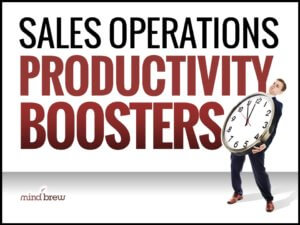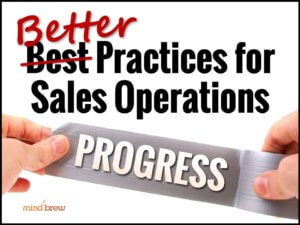Most Sales Ops teams are engaged in a continual struggle to make the most of limited resources. Few have all the staff and budget that they would like to have, so most need to maximize their productivity.
But what does that really mean?
Right now, it’s all the rage for organizations to become more “data-driven.” They want to measure everything — including Sales Ops team productivity — in the hopes of making continuous improvements.
While we’re all in favor of using data to drive the business, you really need to make sure that you are looking at the right data. And when it comes to the Sales Ops team, you need to be measuring results, not activity.
It might be easiest to explain what I mean with a negative example. We’ve heard of some companies in the technology industry that have experienced great success by giving their software developers project tickets that contain small amounts of work. They work in short, two- or three-week sprints to try to get as many of those tickets completed as possible. At the end of the sprint, managers can look back and see how productive the team was by measuring how many tickets they completed and whether they met or exceeded the time estimates for those tickets.
Because this system works well for software development, managers sometimes try to expand something like this approach to other parts of the company. But while there are many benefits to the sprint mindset and agile methodologies, it can sometimes lead you to focus on the wrong things.
If your Sales Ops team is working off a to-do list and trying to get as many things done as possible, you might be very productive — but you might also be very unproductive.
If you complete a huge laundry list of activities, but none of those activities had any measurable impact on the bottom line, have you really been productive? Maybe you would have achieved better results if you had just worked a few hours a day on one project that has a huge impact on bottom-line results. You might even have been able to take long lunches and leave work early, while actually accomplishing more.
Now don’t misunderstand me, we’re not saying you shouldn’t work hard. We don’t want you to come in late, leave early, and goof off in between. But we are saying that you should work hard only on those projects that are really important for the organization.
Before you start a project, determine how you will measure its success. Will it increase margins? Improve customer retention? Shorten the sales cycle? Be specific about what you are hoping to accomplish and then measure success based on whether or not you meet those results-based goals — not based on how many hours you work.
The side benefit of this approach is that it can also make it much easier to answer questions about what value the Sales Ops team provides to the organization. And that can help boost your team’s image and your career.
To learn more about this approach, as well as six other strategies for boosting productivity, check out Sales Ops Productivity Boosters.
It can help your team accomplish more without killing yourself with long hours — and that’s what true productivity is all about.












